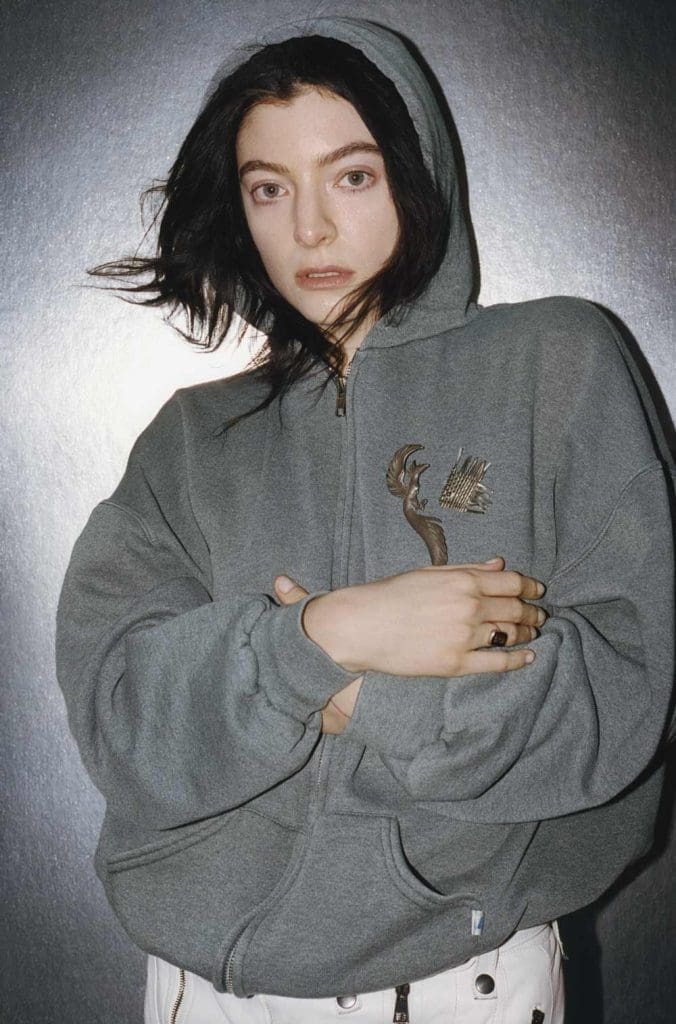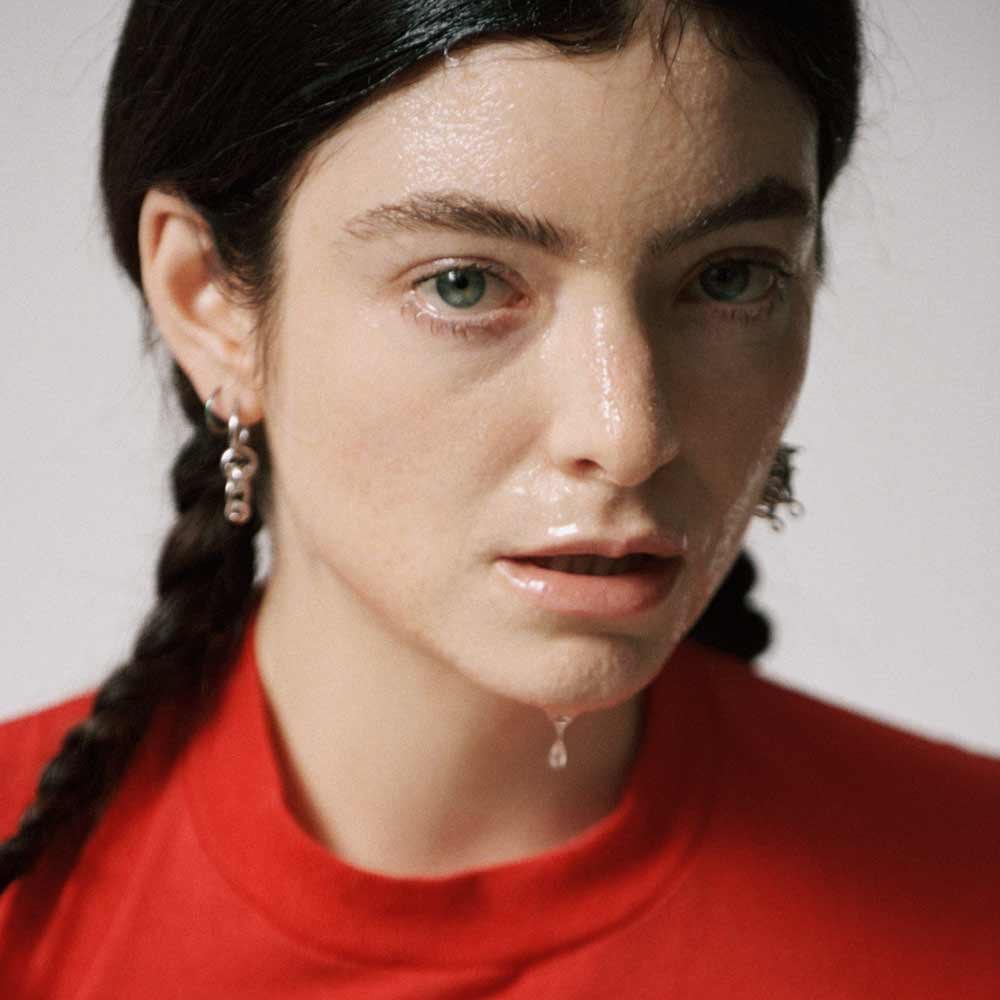Lorde’s Transparent Return
On a sunny April afternoon in New York, a small crowd gathered in Washington Square Park. There was no announcement, no stage, no hoopla. Just a woman with damp hair and an acoustic guitar. The voice was unmistakable. It was Lorde, playing a new song called What Was That. The performance was shaky, unvarnished, and all the more powerful for it.
“I was trying to make a document that reflected my femininity: raw, primal, innocent, elegant, openhearted, spiritual, masc,” she said later. The moment was intimate, almost fragile, and then it was gone. Police asked her to stop, but the message had already been delivered. She was back, and on her own terms.
Born Ella Yelich-O’Connor in Takapuna in 1996, Lorde became an international star before she had even finished high school. Her breakout single Royals, written with producer Joel Little when she was only 16, became an anthem of youthful disillusionment. The track went to number one around the world and won her two Grammys. With her debut album Pure Heroine, she captured the restless boredom of suburban adolescence and the suspicion of a celebrity culture built on excess. Yet from the beginning she resisted being consumed by the machine. “I don’t think about myself as a pop star,” she once told Vanity Fair. “I’m a writer. I make songs and I tell stories.”
Her second album, Melodrama, arrived in 2017 to critical acclaim. It was a maximalist exploration of heartbreak and young adulthood. The record was nominated for Album of the Year at the Grammys and cemented her status as one of the most inventive voices of her generation. Four years later she pivoted again, releasing Solar Power in 2021. That album was sparse, sunlit, and grounded in acoustic textures. It was inspired, she said, by “climate anxiety, quietude, and a desire to step outside the digital glare.” Reception was mixed. Some admired its restraint while others found it too subdued. Lorde later admitted it was a recalibration, a period when she needed to step back from the expectations that had defined her. “I had tried this kind of refusal on Solar Power,” she told Rolling Stone, “and there was something missing. I felt those songs touch my skin, but not hook my guts.”

Now she has returned with Virgin, her most daring and confrontational work yet. The album cover is an X-ray of her pelvis, complete with a zipper, belt buckle, and visible IUD. “The colour of the album is clear like bathwater, windows, ice, spit. Full transparency. The language is plain and unsentimental. The sounds are the same wherever possible,” she explained in an email to fans. “I was trying to see myself, all the way through.” She added, “I’m proud and scared of this album. There’s nowhere to hide. I believe that putting the deepest parts of ourselves to music is what sets us free.”
Virgin is not coy about its themes. Lorde has written about her struggles with disordered eating, about a pregnancy scare, about dissociation while performing. She has also spoken openly about gender fluidity. “I’m a woman except for the days when I’m a man,” she said in Rolling Stone. The songs on Virgin are diaristic and often uncomfortably candid, but they are also liberating. On Man of the Year she describes a moment of imagining herself with men’s jeans, a gold chain, and duct tape across her chest, a fleeting vision that became the seed of a song. “It was a physical sensation of becoming something else for a moment,” she said. The track captures both the seriousness and the playfulness of her explorations of identity.
Musically the record marks a return to electronic textures after the acoustic drift of Solar Power. Working with Jim-E Stack, Dan Nigro, Dev Hynes, and Buddy Ross, she crafted soundscapes that are spare but electrically alive. Critics have noted that Virgin is not revolutionary in its sound but is profound in its honesty. Pitchfork described it as “a gritty, tender, and often transcendent ode to freedom and transformation.” That transformation is not about reinvention for reinvention’s sake. It is about finding a way to be fully human inside an industry that often demands the opposite.
The shock of Virgin is not only in its imagery or lyrics but in the way it strips away performance to reveal process. Lorde has always been self-aware, often critiquing the very culture that made her famous, but this time she takes herself as the subject of critique. She admits openly to having performed through years of dissociation. “I felt myself leave my body sometimes on stage,” she confessed in an interview, “and I could see the girl singing, smiling, doing the job, but I wasn’t there.” Virgin is her attempt to end that separation, to inhabit herself again.
There is a visceral quality to this work. On Hammer, she sings with clenched intensity about pressure and destruction. On Clearblue, the lyrics trace the outline of a pregnancy scare, the kind of detail many pop stars would leave in the shadows. Favourite Daughter offers a meditation on family, inheritance, and expectation, a theme that echoes her conversations with her poet mother, Sonja Yelich. The honesty is startling, yet it is delivered with an elegant restraint that makes it less confessional diary than carefully crafted art. Lorde insists on plain language, calling it “unsentimental, transparent, like ice.”

Her explorations of gender identity are equally unflinching. In one interview she admitted, “I’m a woman except for the days when I’m a man.” That line was repeated endlessly in headlines, but within the album it resonates with nuance. On Man of the Year she embodies masculinity with humour and curiosity, not as rejection but as expansion. She has described the moment of inspiration at a GQ party when she imagined herself wearing men’s jeans, a gold chain, and duct tape across her chest. “It was like I could feel myself shifting into something else,” she said. This moment of play became an anchor point for her writing, proof that identity could be fluid and playful without losing depth.
Critics have been quick to place Virgin within the arc of her career. Pure Heroine was the voice of adolescence, a suburban girl refusing to buy into the myths of celebrity. Melodrama was the sound of young adulthood, messy and brilliant. Solar Power was retreat, a refusal of expectations, and Virgin is confrontation. It is the point where she no longer hides behind metaphor or concept. Instead she opens herself up, both physically with her stark artwork and lyrically with her detailed candour. Pitchfork called the album “a gritty, tender, and often transcendent ode to freedom and transformation.” Other reviewers have noted that while it may not reinvent pop sonically, it reshapes what honesty in pop can look like.
The balance between pride and fear has always defined her work. As a teenager she was praised for her precocity, yet she often rejected the label of prodigy. As an adult she is praised for her candour, yet she admits she sometimes wishes she could stay quiet. The act of creation for her is both exposure and liberation.
Virgin has also reignited conversations about body image and autonomy. In a candid BBC Radio 1 interview she admitted to years of struggle with an eating disorder, explaining how industry pressure around weight and appearance had shaped her sense of self. “I had to learn to live in my body without punishing it,” she said. The decision to place an X-ray of her pelvis on the album cover, complete with visible IUD, belt buckle, and zipper, was both an artistic choice and a personal statement. “It is total transparency,” she explained. “I was trying to see myself, all the way through.” Fans responded with a mix of shock and admiration. Teen Vogue praised it as “a gesture of radical honesty,” noting how rare it is to see a pop artist present their body in such stark, clinical detail rather than through glamour.
The album also repositions Lorde culturally. She was once the reluctant star, the teenage outsider who seemed almost embarrassed by her own fame. Now she embraces her position as a generational voice, but she does so on her own terms. She no longer chases charts or awards. “This is not about trophies,” she said. “It is about survival. It is about making sense of being alive right now.” Her Ultrasound World Tour, announced alongside the album, will take her across North America and Europe, but even the tour name suggests continuity with the album’s themes of transparency and exposure. It is not a spectacle but a continuation of the conversation.
In many ways Virgin is less about reinvention than about integration. Lorde has spoken about wanting to bring together the fragments of herself that fame had split apart. She has been the suburban girl, the reluctant pop star, the maximalist heartbreaker, the sun-worshipping recluse. Now she wants to be all of them at once. “I was trying to make something clear and unsentimental, something that could hold all the contradictions,” she explained. That ambition, to hold contradictions rather than resolve them, is what makes Virgin her most mature work to date.
Even as she navigates questions of identity and transparency, she remains deeply tied to her roots. References to New Zealand continue to weave through her songs, whether in the suburban boredom of Pure Heroine, the oceanic calm of Solar Power, or the grounded intimacy of Virgin. Home anchors her, even as she interrogates everything else. This tether to place may be why her work resonates so deeply. She can experiment with identity and transparency because she knows where she comes from.
The story of Virgin is not the story of a pop star reinventing herself to stay relevant. It is the story of an artist who has already proven her relevance choosing instead to prove her humanity. For Lorde, that is the only measure that matters.

Virgin is more than album, it is a statement about what it means to be a woman and an artist in 2025. Lorde has always stood slightly apart from the pop establishment, but this time she is doing more than resisting formulas. She is rewriting what pop stardom itself can look like. By confronting eating disorders, birth control, pregnancy scares, and fluid identity, she is speaking truths that many listeners share but rarely hear reflected in songs that reach a global stage. “I needed everything to be able to choose,” she told Los 40 when asked about her decision to step away from birth control. The line was not simply about her body, it was about her life and her work. The power of choice, to define oneself moment by moment, has become the album’s pulse.
This insistence on transparency reverberates far beyond music. Virgin has sparked essays about body autonomy, about the symbolism of the IUD in her album artwork, about the way young women in particular navigate expectations. Teen Vogue called it “a gesture of radical honesty.” Rolling Stone highlighted her declaration, “I’m a woman except for the days when I’m a man,” as one of the most significant cultural quotes of the year. It is telling that Lorde did not present these revelations with spectacle. She did not drop a high-budget video or a glossy magazine spread. She stood in a park with a guitar and sang. The simplicity made the message unignorable.
Her cultural reach can be measured in the artists who cite her as influence. Billie Eilish has spoken of the way Pure Heroine opened doors for a different kind of teenage storytelling. Olivia Rodrigo’s diary-like narratives follow a path Lorde helped carve. Yet even as she influences others, Lorde has made it clear that she does not intend to compete. She allows space for new voices while carving her own direction. “I had this deep moment of existential reassessment of my role,” she admitted, “and this album is my answer.” That answer is not another climb to number one. It is a choice to remain an artist on her own terms.
The Ultrasound World Tour will test how this philosophy translates on stage. Named to echo the X-ray imagery of Virgin, the tour promises intimacy rather than spectacle. Fans expect it will be less about fireworks and more about communion, an extension of the park performance that felt so immediate and human. In a world where pop concerts often compete with cinematic universes, Lorde is betting that simplicity, clarity, and raw connection will resonate most deeply. She is placing faith not in scale but in sincerity.
The honesty of Virgin has not been without criticism. Some reviewers have argued that the album lacks the innovation of Melodrama or the daring reinvention of Pure Heroine. But even those who critique its sound acknowledge the bravery of its subject matter. Pitchfork called it “gritty, tender, and often transcendent.” The Daily Lobo wrote that while it may not find much new sonically, it offers something rare: an artist willing to tell the truth without disguise. For many listeners, that truth matters more than innovation.
What Virgin ultimately offers is a new model for how to age in public as a pop star. Lorde is no longer the teenage oracle nor the reluctant celebrity hiding from the spotlight. She is a woman in her late twenties writing about what her life really looks like. She has struggled with her body, questioned her identity, reevaluated her career, and chosen transparency over performance. These are not subjects pop music often embraces, but Lorde has never been interested in what pop music often does. “I believe that putting the deepest parts of ourselves to music is what sets us free,” she wrote in her letter to fans. That belief drives every note of Virgin.
The strength of this record is not in its polish but in its humanity. To listen to Virgin is to enter the contradictions of being alive in this moment: vulnerable yet defiant, frightened yet liberated, grounded yet searching. It is an album that refuses easy answers but insists on honesty. It is Lorde’s most personal and her most generous work, an offering to anyone who has felt fractured, uncertain, or unmoored. In her willingness to be transparent, she gives others permission to be the same.
Lorde’s journey has always been about more than music. From the suburbs of Auckland to the stages of the world, she has made a career of refusing to follow the script. Virgin is the latest refusal, but also a reclamation. It is not an album chasing youth or nostalgia or relevance. It is the sound of an artist who has already proven everything she needs to prove and now chooses to prove only that she is human.
When she stood in Washington Square Park, unannounced and unadorned, her voice cracked and trembled. It was not a perfect performance. It was something rarer. It was real. That is what Virgin is at its core: the return of a voice determined to be real, to see itself all the way through, and to offer that vision, unfiltered, to the world.
